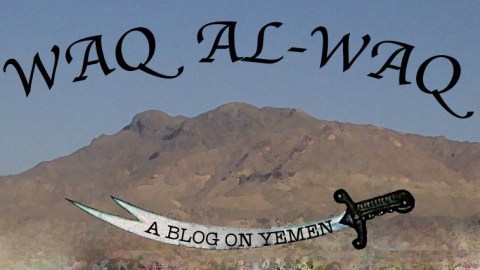Wihayshi’s Allegiance Speech

Earlier today many of the internet jihadi forums posted an official audio tape from the al-Malahim media wing, which released all AQAP’s statements.
(A note of caution: if it doesn’t come from al-Malahim don’t trust that it is from AQAP. There is a big difference between the rubbish spewed on some of the threads on jihadi forums and official statements.)
Much of the statement is what one would expect. On behalf of AQAP, Wihayshi pledges allegiance to the new amir of AQ, Ayman al-Zawahiri. He also claims Ali Abdullah Salih is “doomed.”
But there are also some interesting parts of the short statement that I think deserve highlighting. As al-Masdar pointed out in its piece on the statement (Ar.), Wihayshi attacks the official opposition in Yemen, by which his listeners will understand the JMP, accusing them of wanting to please the US. Given how the JMP has acted lately, Wihayshi isn’t the first person to say this. Indeed many Yemenis in the streets are saying the same thing, but importantly Wihayshi is able to co-opt the criticism for al-Qaeda.
This is something the AQAP leader has done previously, and in my opinion it continues to show that he has a nuanced understanding of the shifting landscape in Yemen, which makes him an incredibly dangerous adversary.
Wihayshi also makes the claims that AQAP supporters are present in the squares of change and squares of freedom around the country. This is probably true, at least in some sense. (How do you measure someone’s private loyalties?) And it really isn’t new, AQAP has done this a number of times previously, particularly in Abyan and Shabwa at public rallies prior to this year’s protests.
That being said, we should be careful not to read too much into Wihayshi’s comments here. AQAP isn’t running the protests, and as much as Wihayshi tries to bend the narrative arc to fit what he has been saying for years there is still a lot of space between the two. Private citizens mixing with protesters aren’t the same thing as an official AQAP presence at the protest centers.
Finally, for me, the most fascinating part of the statement was the very end, in which Wihayshi lays out five points. He calls them “stages.” Nearly all of these (save the final) are focused on the local situation in Yemen, things AQAP claims it would do if it comes to power in particular regions. High on the list are things like re-establishing security (remember the origins of the Taliban?), preserving Yemen’s wealth (many in the country intuitively feel their lives would be better if the government didn’t steal so much of the oil revenue), and so forth.
This is quite obviously a recruiting pitch, an attempt to differentiate AQAP from the government and the opposition, showing as Wihayshi often does that only a return to Islamic law will result in a better life for Yemenis.
It is difficult to judge what, if any impact Wihayshi’s words will have on people in Yemen, but as water, gas, and electrical shortages continue and with food increasingly priced beyond reach it stands to reason that, as I argued months ago in the NY Times, the current climate of instability and insecurity isn’t hurting al-Qaeda. As I said then this may well be the west’s last best chance in Yemen.
The window of opportunity for the US and its international allies to do something in Yemen is closing fast, and no drones aren’t the answer.





